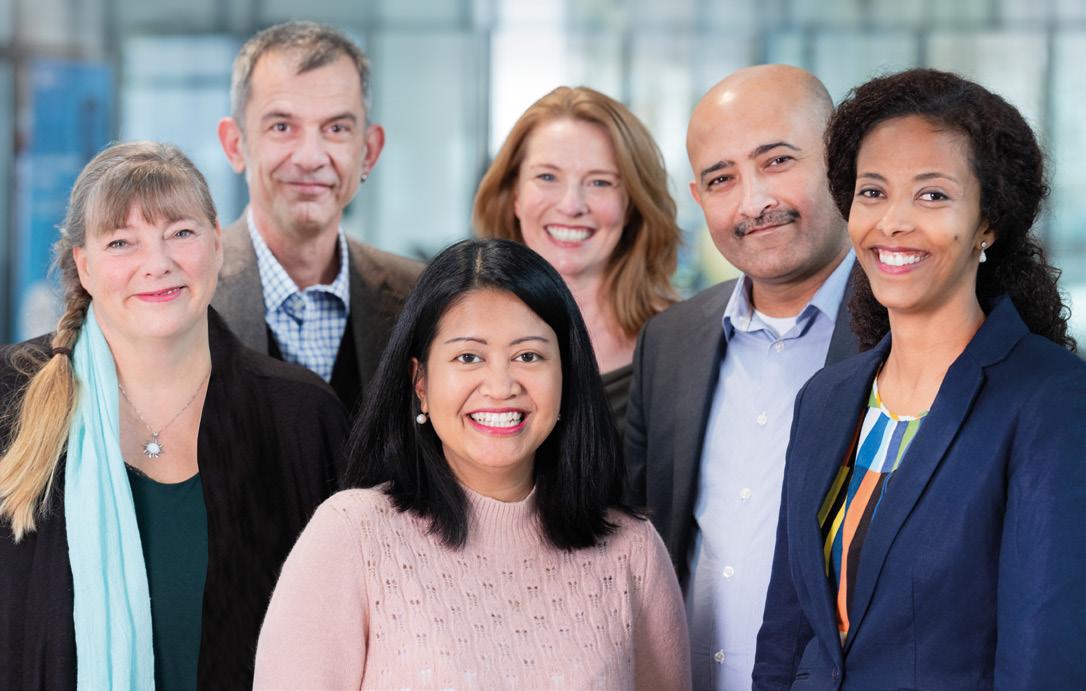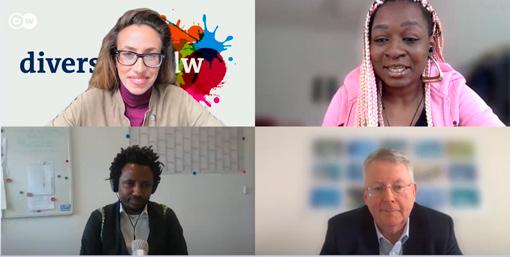
4 minute read
Diversity and Inclusion
Bridging cultures and identities
Embracing diversity — that’s Zahra Nedjabat’s calling. She has been head of DW’s newly established International Relations and Diversity department since the end of 2019. She tells us why diversity matters.
Advertisement
by Ivana Drmić, DW editor
Since Zahra Nedjabat took over her new position last year, she has continued to actively promote diversity among employees at DW. Within this period, she has made various advances such as establishing a diversity working group, leading DW in its maiden participation in Europe’s largest LGBTQ-friendly career fair “Sticks & Stones” and creating a digital format where employees and members of the management team discuss various issues such as everyday racism and discrimination at the work place.
“In the context of diversity, communication must always be bottom-up as well as top-down, and cross-linked in as many directions as possible,” says Nedjabat. For her, diversity is not only about ethnic origin, but also age, gender, sexual orientation, religion, world view as well as a visible or invisible disability. “Even the so-called ‘Old White Men Syndrome’ indicates that people often approach other groups of people with certain stereotypes in mind. This shows that it is necessary to put ourselves in the perspective of another person or group of persons,” she says.

DW has employees from more than 60 countries
© DW/P. Böll
Greatest challenge is implementation
Asked why DW needs a diversity management when after all, it has employees from over 60 nations, Nedjabat says that while “diversity offers enormous opportunities, it also has the potential for conflict. Diversity management is precisely there to make targeted use of these opportunities and advantages. The ability to cooperate is the core competence of the 21st century in view of globalization, digitalization, demographic change.” Nedjabat admits working in an intercultural environment is a huge asset. As an international broadcaster, DW has been diverse for over 65 years now—ahead of many institutions and organizations. Nevertheless, according to her, the potential within the company could be used more. “We should not fall into the trap that makes us believe that we are already so diverse,” Nedjabat says reflecting on what still needs to be done.
According to her, diversity management is something that needs to be established together with the management and employees. She strongly believes in a solution-oriented approach and the power of inclusive language. “The diversity within the company should be reflected in the corporate culture and communication,” she says.
“We are working hard to ensure that there is not only diversity but also inclusion in every department and at every level. Everybody wants to feel respected, seen and to have a voice. This is what DW stands for and this is the culture we want to promote and sustain,” she concludes.

Zahra Nedjabat
© DW/P. Böll
Zahra Nedjabat
head of International Relations and Diversity since late 2019, studied comparative literature, Islamic studies, philosophy and history in Bonn and Paris. She was head of corporate communications and PR and she worked as an editor, lecturer and management consultant. She gained journalistic experience at BBC World and RC 93.9 FM Paris. Since 2014 she has been organizing the Vienna International ChristianIslamic Summer University together with the University of Vienna.
JaafarTalk: Transcending barriers

© DW
“The Arab world is undergoing massive social change. We want to confront the people with the diversity and modernity of the region and encourage them to exchange ideas while seeing eye to eye,” host Jaafar Abdul Karim said at the launch of the eponymous TV show in 2019.
One year later, the show is doing just that. In May 2020, Jaafar Abdul Karim’s interview with prominent Egyptian actor Hesham Salim and his transgender son stirred an important debate. Salim and his son Nour, formerly Noura, received emotional and mostly positive reactions from many viewers in the Arab world—a region where sexual identities are rarely discussed publicly. Nour told his father on the show: “I thought I wasn’t a normal person, I thought I couldn’t live my life. It was very, very hard. But I learned to love myself and stand on my own two feet.”
Internal debate series ‘Change of Perspective’

© DW
DW has a new digital format titled “Perspektiv:Wechsel” which calls for a change of perspective and provides an additional platform where employees and management can discuss real-life experiences on various key diversity issues such as origin, age, disability, sexual orientation, gender, religion and ideology at DW.
In the first session of the series, DW Director General Peter Limbourg and employees reflect critically on the status quo and DW’s internal structures. They discuss whether Deutsche Welle and its employees from over 60 nations are immune to discrimination and racism or whether a multicultural environment provides a breeding ground for conflict.
The second session explores the opportunities and challenges that diversity presents at DW when it comes to generational differences.










